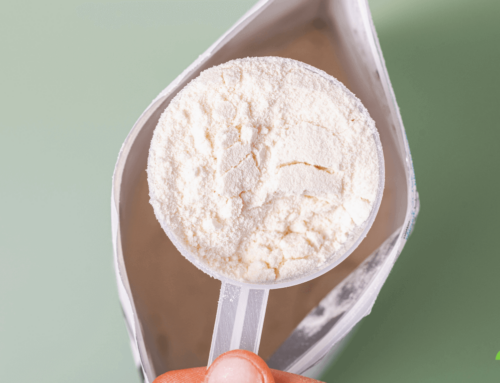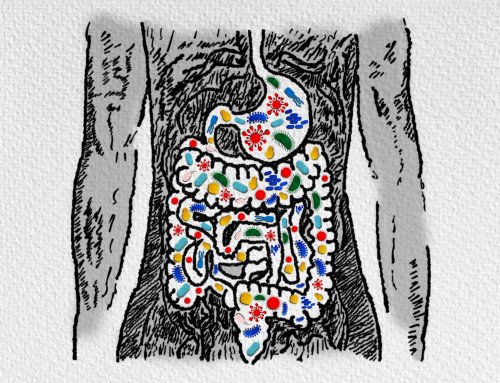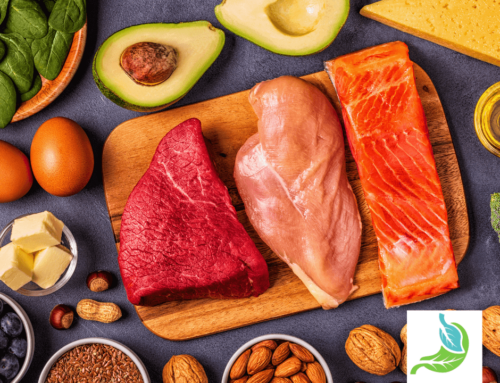- Vitamin and mineral deficiencies
- Microbiota imbalances
- Deficiencies in molecules made by the body such as stomach acid, bile and digestive enzymes
- Symptoms including gas, bloating, pain, diarrhea, constipation, heartburn, and other reflux and LPR-related symptoms
These deficiencies often arise as the result of digestive health issues involving small intestinal bacterial overgrowth (SIBO), Crohn’s or celiac disease, H. pylori or other GI infections, gall bladder or pancreas problems, surgery, poor nutrition, genetics and cancer.
Here are some examples of effective supplements and what they are good for:
- Lactase enzyme: for people with lactose intolerance who consume dairy
- Amylase enzyme: for problems digesting starch. We now know that gene copy number for salivary amylase (AMY 1) varies greatly from person to person depending on where our ancestors originated. Those with fewer gene copies produce less amylase and digest starch less efficiently.
- Amylase, protease, lipase enzyme combination: for exocrine pancreatic insufficiency where these enzymes are not being produced or released in sufficient quantities resulting in maldigestion and malabsorption of carbohydrates, proteins and / or fats.
- Ox bile: for people having trouble digesting fats, often following gall-bladder surgery. Alternatively, people experiencing diarrhea from bile acid malabsorption (BAM) may benefit from bile acid sequestrants.
- Vitamins: deficiencies in every vitamin are possible, but for SIBO related conditions, vitamin B12 (nerve and blood cell health) and fat soluble vitamin A, D, E and K (building healthy cells, and producing hormones) deficiencies are common. Vitamin B12 supplementation is often required because SIBO bacteria compete for it thus creating a deficiency. If you have atrophic gastritis (loss of stomach acid), vitamin B12 may also be needed because it promotes SIBO and reduces a protein required to absorb vitamin B12, which is called intrinsic factor. Pernicious anemia, an autoimmune condition can result in both B12 and B9-folate deficiencies. Fat soluble vitamins are recommended for SIBO because SIBO bacteria can deconjugate bile salts impacting our ability to digest fats which would include fat-soluble vitamins. SIBO may affect the absorption of other vitamins as well.
- Minerals: especially magnesium (nerve, bone and heart health), calcium (bone, muscle, nerve and heart health), iron [1] (hemoglobin for red blood cells and neurotransmitters for brain health) and zinc (healthy immune system, intestinal barrier, proteins and DNA) when evidence of SIBO or low stomach acid exists. Stomach acid is required for mineral absorption, and SIBO bacteria compete for iron and can alter the absorption of other minerals.
- Apple cider vinegar or betaine HCl: when low stomach acid is determined or suspected. The most common cause of low stomach acid is acid-reducing drugs (PPIs and H2 Blockers) followed by atrophic gastritis due to prolonged H. pylori infection, which requires antibiotic treatment. These supplements add acid to your stomach as an interim solution.
- L-glutamine: L-glutamine is produced by the body, but blood and tissue levels can be impacted by illness and inflammation. Under these conditions, supplementation may improve gut barrier function and support the immune system.
- Iberogast: Herbal supplement for dyspepsia which includes heartburn and other symptoms. Ibergast may also improve motility.
- Probiotics: Though the clinical track record for probiotics is mixed, certain probiotics have shown to be beneficial. Examples include:
- Saccharomyces boulardii for infectious or antibiotic-associated diarrhea, preventing the recurrence of C. diff infection and countering the effects of pathogenic E. coli strains. Lactobacillus and Enterococcus strains have also shown promise for diarrhea.
- Bifidobacterium / Lactobacillus combinations for SIBO and IBS
- Lactobacillus plantarum 299v for IBS, particularly pain and bloating
- Bacillus clausii for SIBO
- Bacillus subtilis (the probiotic in natto) in support of (but not in place of) antibiotic treatment of H. pylori
- Herbal antibiotics: According to a recent study, herbal antibiotics may be useful in treating SIBO. But like synthetic antibiotics, herbal antibiotics are a double edged sword. While they may kill or inhibit unwanted or overgrowing bacteria, they can also kill or inhibit healthy gut bacteria. For this reason, I recommend experimenting with these only as a last resort if all else (diet, behavioral modifications, enzymes, probiotics, etc.) fails. For more information, refer to my article on antibiotics for IBS.
Are your supplements effective?
While many dietary supplements have proven health benefits, taking too many without a clear evaluation of the supplement and the condition for which the supplement is being used can create more problems than they solve. I evaluate a large number of supplements for our clients during our consultation process. When I do that, these are some of the things I look at:
1. Is the supplement safe and of good quality?
As the Food and Drug Administration (FDA) published guidelines for the manufacture of drugs, it also published guidelines for the manufacture of dietary supplements (Dietary Supplement Health and Education act – 21 CFR Part 111). But the FDA does not require supplement companies to receive their approval prior to producing and marketing their products. Instead, they are “trusted to comply” with the FDA guidelines. So you cannot be certain that all supplements you buy are safe and effective even if company advertisements state they are “natural”. Thus getting your supplements from reputable companies is important.
Also, the guidelines have never been updated after the original draft document published in 1994 and are incomplete. For instance, unlike the regulations for drugs, the dietary supplement guidelines have no requirement for companies to perform stability testing which ensures potency at the end of their shelf life. Nor do the guidelines require companies to report adverse events associated with their products to the FDA.
The guidelines are also less robust with regard to production requirements. While the drug manufacturing process routinely uses high quality USP grade water, dietary supplements can actually be manufactured with “potable” or “city” water, which is pretty much like what comes out of the tap. City water is significantly lower quality than USP water, which is highly processed to remove contaminants and microorganisms.
Most importantly, imported supplements (with the exception of certain individual countries such as Canada which have relatively high standards) are much more likely to contain harmful or illegal ingredients and contaminants including lead, arsenic and mercury.
As part of my review, I look at the active ingredient(s) and inactive excipients in each supplement. Are they legal and have they been demonstrated to be safe? Are there published studies available on the safety and efficacy of supplements containing the ingredients? Also, are there any warnings about the ingredients or supplements containing the ingredients listed on FDA.gov?
2. Does the supplement have side effects or interact negatively with other supplements or drugs?
There are many helpful supplements with limited downside risks, but that is not the case for all supplements. The most egregious examples involve tainted weight-loss products containing a variety of other drugs including anti-seizure drugs, blood pressure medications and even antidepressants. In one example from the link above, the FDA identified a weight-loss supplement containing sibutramine which had previously been banned due to cardiovascular and stroke risk.
But problems arise even with products that are not adulterated. The FDA warned that certain Zicam cold remedy products may cause a loss of your sense of smell. This has been documented in 130 cases and may involve zinc used in the product. The side effect / risk profile of individual supplements is compounded under certain circumstances where:
-
Multiple supplements are combined or a supplement contains multiple active ingredients:
The biggest issue I find working with people taking multiple supplements is that the same ingredients are present in multiple supplements potentially leading to over-supplementation. Vitamin overdose is the best example.
And some “kitchen sink supplements” include ingredients that may be contributing to the very problem you are trying to solve. For instance, digestive enzyme supplementation makes sense for people with a specific digestive enzyme deficiency, but some digestive enzyme combinations include not only the enzyme(s) needed to address the specific deficiency, but also a wide variety of other enzymes.
If you had SIBO for instance and decided to supplement with amylase enzyme when you consume starches, you would not want a combination enzyme supplement containing many other enzymes including fiber-digesting enzymes. Fiber-digesting enzymes will digest dietary fiber prematurely thus increasing the fermentable carbohydrate load in the small intestine. This could make the SIBO worse. The goal should be digestion of complex fibers by bacteria in the large intestine.
Another example is multi-strain probiotics. Does your probiotic include gas-producing probiotic strains? If you were dealing with gas, bloating or acid reflux, gas-producing probiotic strains may make the bloating, gas and reflux worse. A better bet may be to try non-gas producing “homolactic” probiotic strains such as Lactobacillus acidophilus or Lactobacillus salivarious. There are also several Bifidobacterium and Lactic acid bacteria strains that are “facultative heterolactic” fermenters, meaning they produce gas only under certain circumstances. Thus, they may provide benefit without producing too much gas. The last choice would be “obligate heterolactic” strains that produce gas at all times. Examples include: Lactobacillus brevis and Lactobacillus fermentum.
-
Supplements are taken with drugs:
It’s important to remember that there were no modern drugs when most herbal treatments were discovered hundreds or thousands of years ago. Now, dietary supplements are relatively inexpensive and available without a prescription. At the same time, a huge variety of pharmaceutical drugs are on the market. This is a recipe for trouble. There is no shortage of examples where dietary supplements interact negatively with drugs.
You would not want to take betaine HCl (increases stomach acid) together with a proton pump inhibitor such as Nexium (reduces stomach acid). These are acting in complete opposition.
Another example involves herbs which affect the activity of anti-coagulant medications such as warfarin. Excess vitamin K supplementation and even foods high in vitamin K can also affect the activity of warfarin as can CoenzymeQ10.
Here is a list of other dietary supplements that interact with drugs.
-
The incorrect supplement dose (typically overdose) is taken:
Too much of a good thing can be bad and taxing your digestion or metabolism. And some supplements consumed in excess are quite toxic. Vitamin A overdose can lead nausea, vision problems, dizziness, bone pain / fracture, liver toxicity and much more. Overdose of vitamin D can lead to hypercalcemia, nausea and vomiting, weakness, frequent urination and kidney problems. Too much iron can cause nausea, vomiting, liver damage and even death.
Even if not outright toxic, many supplements have optimal ranges, for instance probiotic studies have found that there is a sweet spot in dosing where probiotics are effective and increasing the dose may results in a loss of benefit. In the case of SIBO, there is also the possibility that some probiotic strains could contribute to the bacterial burden in the small intestine.
-
A supplement is taken when a more powerful drug is needed:
There is a belief that hepatitis C can be successfully treated with ayuvedic herbs. While there is some support for this idea in a study showing that the ayuvedic herb Eclipta alba can suppress hepatitis C replication under laboratory conditions, there is no clinical data I am aware of showing that this herb can cure an actual infection. On the other hand, Gilead’s new drug Sovaldi (sofosbuvir) can cure this infection in almost every case.
3. Is the supplement actually working for you?
This one may sound like common sense, but I am amazed at how often I ask this question and the answer is simply “I don’t know”. Just because someone recommended a supplement for you, it doesn’t mean that it’s going to work as we are all different, and similar symptoms can be caused by different underlying problems. Just as good science has at its core careful observation, the final evaluation of a supplement should include an answer to some basic questions:
- Does it work?
- Do you feel better?
- Have you noticed an improvement in your condition or symptoms?
One of the best ways to determine if a supplement is working is to do your best to keep everything else (diet, drugs, other supplements) constant for a couple of weeks when you add a new supplement. This way, you have a better chance of attributing any change (good or bad) to the specific supplement.
In cases where you can’t directly observe the effect of supplementation, there are usually tests that can help you determine if supplementation is working. Atrophic gastritis, chronic PPI use and Pernicious anemia can all lead to B12 deficiency, which may not be fully treatable with oral B12 supplementation. Because these conditions can all affect the production of intrinsic factor protein needed for B12 absorption, a blood test may reveal that B12 injections are required.
4. How many fermentable carbs are in the supplement?
For people with functional gastrointestinal disorders, SIBO and related conditions, be aware of how many grams of prebiotic or other fermentable carbohydrates or sugar alcohols are in individual supplements. This is critical because these hidden carbohydrates can add up quickly and derail your recovery by overfeeding gas producing bacteria in your small and even in your large intestine. If you are on the Fast Tract Diet, make sure you calculate or look up the FP points for each supplement and add them to your daily total.
Next step
If you are taking multiple supplements, I would suggest that you go through the process for evaluation. When in doubt, remember that oftentimes, less is more. Through working with clients taking a large number of dietary supplements, I have found that most people benefit from 1. reducing the number of supplements and 2. making necessary dietary and behavioral changes in terms of gut health and symptom elimination.
Feel Better, Live Long, Enjoy Life
[1] Iron supplementation should be done under your doctor’s supervision as too much iron is toxic.







Great article! Speaking of fiber (in the light of FTD), are there supplements that help to reduce digestion of fiber? My gut feeling tells me that nothing helps as much as reducing the amount of fiber intake itself.
Hi Andrea, Not that I know of, and I’m not sure its such a great idea. The FTD is not aiming to “starve” our microbiota, just put them on a diet. I agree with you that limiting fiber is the best approach.
Since one year ago I have treated my SIBO by eating almost all supplements you mentioned in the article. I also included the garlic pills, Allimed® with great success.
SIBO is gone and all my blood tests shows that my level of; Iron, B12, Magnesium, D-vitamin, Selenium is today on a normal level.
I also take some apple vinegar, Q10 and probiotics with good result.
Another positive side effect of my treatment is that my “fluctuating” heart rate (paroxysmalis fibrillation atrii cordis) is normal and that is a great relief for me.
My main concern is that I do not dare to quit with all my supplements or do I need to continue forever ? I am not sure if “less I more”…
Catarina, When I read your post I was so relieved. I too have PAF for over 20 years and have been convinced it was triggered by my digestive system. Within the past year I developed SIBO ( although I may have had it longer,)and have started following the Fast Tact Diet. None of the doctors I visited since the beginning of PAF would acknowledge it could be triggered by some digestive problem. I experience my a-fib episodes like clockwork, every 7 days at night while I sleep. The episodes last from 5 to 8 hours and I can usually end them by drinking a green drink with cucumber juice. It has been a very difficult situation to handle over the years as I’m sure you well know. My question to you is how long after you began the Fast Track Diet and suggestions from Dr. Norm did your A-Fib episodes stop? Were they at all similar to mine? I would love to know. Thanks
Thanks for sharing your story Catarina and some details concerning supplements that worked for you. You might be right in your case. If you have identified some supplements that are clearly helping, I can see why you would be reluctant to stop.
Terrific (information!! Thanks a lot
Emerson
I have been fighting SIBO for two years and am having trouble finding a probiotic that works. I very much believe that I need to replenish the good bacteria after all the antibiotics I have taken over the years. Your article was great to point out the strains that are helpful..::.but can you give a brand name of a probiotic to use after treatment with antibiotics? So many include prebiotics which I try to stay away from.
Makes a lot of sense. I wondered if you ever looked into Grocare. The make herbal remedies such as hernica for haital hernia and Acidim for GERD. I started taking it this week along with readjusting my diet. Just wondered if you had thoughts? Since I spoke with you over a year ago, my LPR is mostly gone. The acid reflux and hernia still haunt me but working on it. Thanks
I haven’t Connie. But i would personally take a close look at supplements made in India before swallowing one.
Hi.I had gallbladder removed 5yrs ago. I have multiple bouts of diarrhea. Nine mods, two naturopaths. I have tried lots of mess and supplements. I’m still in trouble, HELP
Great Topic! Just a few companies in The US follow and manufacture good quality supplements. Only 80% of supplements manufacturing companies follow the UK regulations. The only countries that actually enforce the food and supplements regulations are Canada and the Scandinavian countries. You can see that by looking at the prices. I had blood work done in January 2016 in the US, while I was in a Ketogenic diet, and taking high supplementation in fish oil+vitamin D3 1000IU, Vitamin C 1000mg with bioflavonoids, Vitamin B12 5000mcg liquid form, magnesium+calcium+Selenium, Probiotic Primal defense. On August 2016, I had blood work done in Europe, by a lab quality certified etc etc, and I was in the same diet, but with zero supplementation. All blood markers were exactly the same, including the CMP. You take your own conclusions.
Interesting. Not surprised at all.
Above I meant to say “As much as 80% of supplements manufacturing companies do not follow the UK regulations.”
Hi. I had gallbladder removed 4-5 years ago. I now have chronic diarrhea, severe weight loss, food intolerances, etc. I have seen 7 doctors and 4 naturopaths to no avail. I am now doctoring myself (which is stupid), but I don’t know what else to do! Any ideas? By the way does of bile give anyone stomach aches! Thanx
Hi Susan,
One thing you can explore with your doctor is bile acid malabsorption (BAM), a common cause of diarrhea. See our consultation tab is you are interested in more help with this.
I have too high B12 levels according to blood test
I have sibo
Do you recommend not taking B12 supplements ?
Hi Marie, B12 absorption from bacteria that produce it such as Propionibacterium, Klebsiella and Psuedomonas species is quite complex which can give variable results. While not supplementing while levels are high, getting to the bottom of the overgrowth and retesting for B12 makes sense. Let us know if we can help via our consultation program.
Hi my sister wants me to take laminine and associated products including a digestive supplement. Do you have an opinion on this product? All I can find on the Internet are opinions. No real data backed by any research. Thankyou.
That’s what I have found as well. Sounds interesting, but some data would be nice.
Thank you for this wonderful article! There are so many interesting things about supplements and digestion.
With respect,
Victor Dan
Hi Norm,
I react badly to B12, regardless what form and how low the dosage. At first I get a nice warm feeling, energy increased libido, and then I crash a few days later. I feel feverish with very tense upper back and neck muscles, fatigue, headaches and acute painful areas around my rib cage like I’ve been stung by wasps. I’ve tried cobalamin shots, Hydroxo, methyl, sublinguals. They all bring on the same symptoms. The adenosyl form does not seem to bother me but I didn’t dare try it for long. Any idea what might be happening? Is the B12 raising the histamine too high?
Hi Alex,
Sorry, no idea. B12 is generally regarded as safe even at high doses which you can’t say for Vit B6 for example. You may be doing this already, but exploring why you’re low to begin with might help. Low stomach acid, anti-intrinsic or anti-parietal cell abs, small intestinal issues, SIBO, etc.
Hello Norm, I have Sibo (high methane),IBS, bloating and pain in the gut. Also my B12 are very high(2000), my stool are always dark green and 20 year of loose bowel. I started FTD and was doing better but it all turned, I am now constipated and lost 15 pounds (much to skinny) have acid reflux, bile in the stomach, acute esophagitis, noise in the gut like a waterfall. Can you help me thru your consultation program.
Hi Christine, I suggest you contact us (consultation tab on this site) and schedule a brief pre-consult. There is not charge for this.